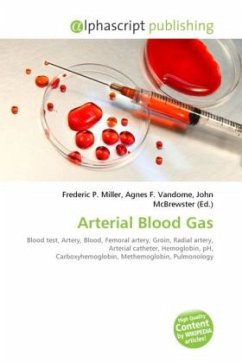High Quality Content by WIKIPEDIA articles! An arterial blood gas (ABG) is a blood test that is performed using blood from an artery. It involves puncturing an artery with a thin needle and syringe and drawing a small volume of blood. The most common puncture site is the radial artery at the wrist, but sometimes the femoral artery in the groin or other sites are used. The blood can also be drawn from an arterial catheter. The test is used to determine the pH of the blood, the partial pressure of carbon dioxide and oxygen, and the bicarbonate level. Many blood gas analyzers will also report concentrations of lactate, hemoglobin, several electrolytes, oxyhemoglobin, carboxyhemoglobin and methemoglobin. ABG testing is mainly used in pulmonology, to determine gas exchange levels in the blood related to lung function, but has a variety of applications in other areas of medicine. Combinations of disorders can be complex and difficult to interpret, so calculators, nomograms, and rules of thumb are commonly used.
Bitte wählen Sie Ihr Anliegen aus.
Rechnungen
Retourenschein anfordern
Bestellstatus
Storno








